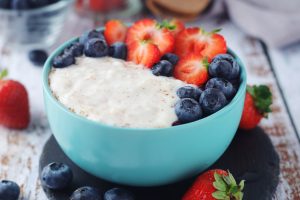Probiotics and Prebiotics
To understand the difference between prebiotics and probiotics, we have to look at their properties both separately and jointly. Prebiotics and probiotics are equally important for the healthy development of the human body. They build and maintain healthy colonies of microorganisms and bacteria that support the digestive system.
Prebiotics are fibers that help in digestion without which, our bodies cannot function. Probiotics are microorganisms that feed on prebiotics to keep the gut healthy and happy. Both types promote the healthy growth of bacteria and microorganisms in the gut, which plays a vital role in developing a strong immune system.
Let’s dive deeper into the topic and look at the different properties of probiotics and prebiotics.
Difference Between Prebiotics and Probiotics
Prebiotics and probiotics are healthy food components that our bodies require to survive, but they are different from one another. Each has its own benefits, side effects, and food groups that are essential for our health.
Prebiotics: Foods
There are many foods that contain a good amount of prebiotics to aid in digestion. Prebiotics are carbs that our bodies can’t digest, so they move to the lower digestive tract and help gut bacteria grow and flourish. When we talk about the difference between prebiotics and probiotics, the foods that we consume matter a lot. Here are some of the foods rich in prebiotics:
- Apples
- Bananas
- Berries
- Oats
- Garlic
- Flaxseed
- Tomatoes
- Green vegetables
- Onions
These foods have probiotics naturally, but there are others that have added prebiotics. These foods are:
- Yogurt
- Cereal
- Baby formula
- Bread
- Cookies
Prebiotics: Benefits
Prebiotics has one main function, which is to support and help the probiotics grow. However, that’s not the only thing prebiotics have to do. They also help reduce cholesterol levels, improve the health of the gut wall and regulate blood sugar.
Prebiotics also aid in fermenting the food so that it stays for a lesser time in the digestive tract. It prevents constipation and regulates proper bowel movement.
There are many ways to consume prebiotics, but it’s healthier to eat whole foods. They also have proteins, vitamins, and minerals that contribute to the nutrition and wellness of the body. It is important to consume a balanced amount of prebiotics. Experts say 5 grams per day is sufficient for a healthy individual.
Prebiotics: Side Effects
If too many prebiotics is consumed, it can lead to problems causing further irritation of the digestive system. The research on the side effects of prebiotics is new, but it can still help understand the difference between prebiotics and probiotics. Most common side effects are:
- Diarrhea
- Constipation
- Gas
- Bloating
These side effects are rare but can still affect a person combined with another illness, like irritable bowel syndrome (IBS) and small intestinal bacterial overgrowth (SIBO).
Probiotics: Foods
Probiotics are healthy bacteria that can improve digestion and promote a healthy lifestyle. Although probiotic supplements are available, it’s better to consume healthy food fermented with probiotics. These are some of the best probiotic-rich foods:
available, it’s better to consume healthy food fermented with probiotics. These are some of the best probiotic-rich foods:
- Yogurt: it has friendly bacteria that improve bone health and aid in high blood pressure.
- Tempeh: a fermented soybean product working as a substitute for high-protein meals.
- Kefir: a fermented milk product that cultures yeast and lactic acid bacteria.
- Pickles: Cucumbers are fermented for some time after they are pickled in salt and water. They are a great source of vitamin K.
Probiotics: Benefits
A healthy gut contributes to a healthy immune system, and probiotics are an important factor in making that happen. When a baby takes probiotics in the first year, they have a stronger immune system and are less likely to develop allergies.
For teenagers, it improves their skin and stabilizes their moods. For adults, probiotics help with weight loss, stress relief, and managing IBS symptoms.
Probiotics also have different benefits for men and women. As men are more inclined to have stress-related heart diseases, probiotics can improve their sleep and produce serotonin. For women who take probiotics regularly, they have easier pregnancies and enhanced fertility.
The benefits of these microorganisms make the difference between prebiotics and probiotics clear. We can say that they are beneficial at every stage of life, regardless of age or gender.
Probiotics: Side Effects
The microbes in probiotic-rich food and supplements naturally exist in our bodies, so taking probiotics on a regular basis is safe for most of us. However, it might trigger allergies in people who have a weakened immune system, a life-threatening illness, or have gone through recent surgery.
Some people also experience mild stomach problems like diarrhea, bloating, or increased gas. Probiotics may only cause these symptoms in the first few days, but eventually, they will subside.
What Happens When Prebiotics and Probiotics Work Together?
Although probiotic bacteria are important, they can’t survive unless we eat foods that promote their growth. This is where the difference between prebiotics and probiotics is evident. Without enough prebiotics, they can’t multiply and stay dominant in the intestine, among other bacteria.
When prebiotics and probiotics are combined, they form ‘synbiotics’ which improve the growth of gastrointestinal bacteria. Taking prebiotics makes synbiotics more efficient for digestion as they stimulate beneficial bacteria instead of pathogens.
Taking prebiotics and probiotics together can repopulate the gut bacteria in a healthy way and restore your body to its best health. It’s essential, especially after going through medical treatment or an illness that destroys the beneficial bacteria in the gut.
Prebiotics and probiotics have more benefits than side effects, so it’s clear how important they are for our health. From keeping our immune systems strong to aiding a healthier mind, they are both essential for healthy living. The only thing we need to focus on is keeping the right balance between the two for a healthier gut!

